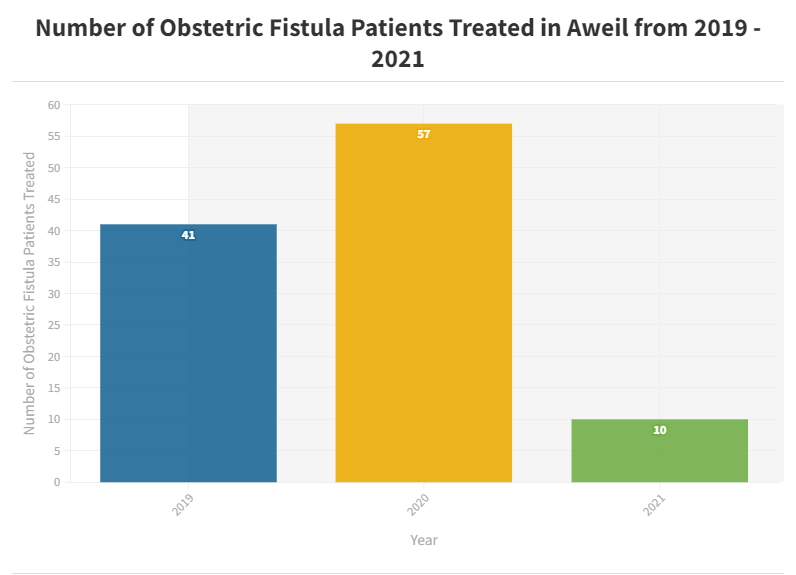Data Story: Statistics of Obstetric Fistula Treatment in Aweil from 2019 to 2021
By Ngor Deng Matem
This story looks into the trends of obstetric fistula treatment of the local population in Aweil, Northern Bahr-el-Ghazal State from 2019 to 2021.
The treatment exercises were carried out by the Ministry of Health and its partners including United Nations Population Fund (UNFPA) and the International Rescue Committee (IRC).
In 2019, 41 cases of fistula from Aweil were successfully treated, 57 cases were successfully treated in 2020, and 10 cases were successfully treated in 2021.
Only 10 of the 17 patients registered in 2021 received treatment, with the remaining seven not receiving treatment due to a lack of financial support to travel from villages. One hundred and eight patients have been treated in total since 2019.
Fistula Treatment in Aweil By Year
| Year | Number of Patients Treated |
| 2019 | 41 |
| 2020 | 57 |
| 2021 | 10 |
Total Cases Treated and Not Treated Since 2019
| Total Cases Treated | 108 |
| Total Cases Not Treated | 07 |
| Total Cases Registered | 115 |
What is obstetric fistula?
Obstetric Fistula is a severe birth injury that causes a hole between the birth canal, bladder, and rectum. The infection is caused by both prolonged labor without medical care and early pregnancy. The conditions typically affect patients, particularly women, because they promote uncontrolled urine and faeces.
Challenges:
The following are some of the setbacks in the fight against fistula in Northern Bahr-el-Ghazal; patients claim that they are neglected by relatives, particularly husbands, due to the smell. Inadequate financial support to cater for or facilitate logistics during the rare treatment that takes place in Wau. Lack of doctors in Northern Bahr el Ghazal State, as well as low patient turnout due to a lack of mobilization.
Way forward:
To ensure the success of the fight against fistula, the following recommendations are being made: The Ministry of Health should encourage pregnant women to visit the hospital on a regular basis for medical checks, and child marriage should be discouraged because the majority of cases involve women who marry at a young age.
The government of Northern Bahr-el-Ghazal should plan to establish treatment centers within the state to avoid the need to travel from Aweil to Wau, and the public has urged the Ministry of Health to increase awareness of the campaign to end child marriage.
About the Authors:
Ngor Deng Matem at #defyhatenow South Sudan, wrote this data story, which was edited by 211 Check Editor Emmanuel Bida Thomas and approved for publication by Steve Topua, Data Analyst and Trainer. It’s part of the ongoing #defyhatenow South Sudan Data Speaks Fellowship program with funding from the European Union Delegation to South Sudan.
About South Sudan Data Speaks Fellowship:
This is a two-month and half data journalism fellowship for South Sudanese content creators with an aim of educating participants on the fundamentals of data journalism through in-depth training facilitated by experienced data analysts.
The fellows have been selected from across South Sudan and they are trained in data sourcing/mining, data analysis, and data visualization for two months and half (October to Mid December)
Each fellow will produce a minimum of three (03) data stories during the fellowship. The focus will be on increasing access to information

 211 Check
211 Check
 211 Check
211 Check
Leave a Reply
Want to join the discussion?Feel free to contribute!